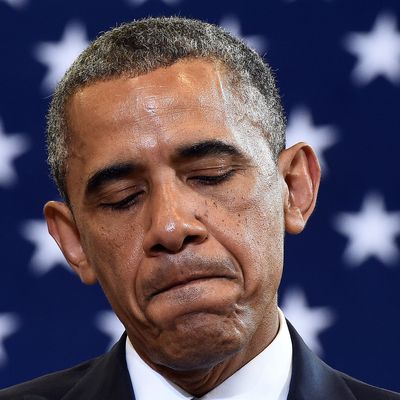
“Don’t think Obama has reduced inequality? These numbers prove that he has.”
It’s a catchy headline from the Washington Post, and a common-sense reading of it would suggest that President Obama has managed to narrow the once-yawning gap between the haves and the have-nots. But here comes the tricky bit: President Obama has reduced inequality, but inequality has not fallen during his presidency.
How does that work? Well, had President Obama’s new tax policies never come into effect, inequality would be higher than it is right now. But inequality has nevertheless grown in the years he has been in office. The change in market outcomes is outpacing the change in government policy. A fancy way of saying it is that the tax code has become more progressive, but not more redistributive. (For much more on this, read Tim Noah, who literally wrote the book on inequality.)
There’s a lesson to take away from all of this, and not necessarily a comforting one. As evidenced by the Post piece, federal policies can and do have a tremendous impact on inequality. But only “post-tax, post-transfer” inequality, as the wonks call it, has diminished during the Obama years — not what families earn, but what they live on, after Uncle Sam has swooped in with his capital-gains taxes and credits for single parents and all of that.
But there’s a queasy feeling among Democrats that at this point federal redistributive policies are tapped out. You’re not just going to convince this Congress to pass another piece of legislation that takes money from the rich and gives it to the poor, or another piece of legislation that taxes the rich a bit more and while maintaining rates for low-income families. That feeling is, of course, markedly stronger among Republicans, who are making an election-year push to reduce poverty with programmatic reforms, not new money.
That means that progress on inequality in the coming years is going to have to come primarily from the pre-tax, pre-transfer side — meaning it might not come from anywhere at all. The improving economy could cause inequality to fall in many ways. A tighter labor market could lead to higher wages. Growing industries — oil and gas, technology, health care — could add middle-class workers. The market could top out, leading to stagnant incomes for the one percent. But thus far, there are no signs of real wage pressure; industries at the high and low end of the wage scale are adding workers faster than industries in the middle; and the market has not stopped climbing. There’s nothing on the economic horizon that seems to portend a great surge in middle-class jobs and wages (though I would be delighted if I were wrong about that).
Any number of changes in federal policy could have a major impact on the distribution of market incomes — on pre-transfer, pre-tax inequality — if only in the long run, not the short run. Universal pre-kindergarten, for instance, might help boost the earnings and educational achievement of millions of lower-income kids. (That’s why my hunch is that Hillary Clinton will include that policy as a centerpiece of her domestic policy agenda, when she finally admits she’s running. You heard it here first, folks.) Expanding and improving the quality of higher education — and figuring out how to control its cost and improve its financing — would help a lot, too. But it’s just as hard to imagine this Congress passing those longer-term initiatives. They’re expensive, and finding the money to pay for them won’t be easy.
Still, let’s not end on such a gloomy note. Remember when I said, “progress on inequality in the coming years is going to have to come from the pre-tax, pre-transfer side”? As the Post piece notes, the trillion-dollar, hugely redistributive Affordable Care Act has yet to come into full effect. Millions of very low-income Americans are getting free access to Medicaid this year, a benefit worth thousands of dollars annually. Millions of low- and middle-income households are starting to get tax subsidies to help cover the cost of their insurance premiums. When that shows up in the data, in the next year or two, inequality might narrow.





























